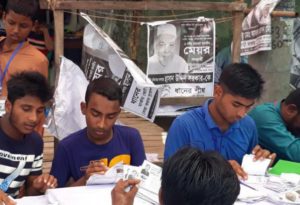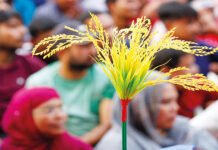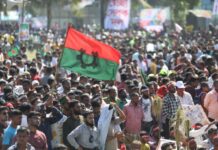Popcorn clouds of uncertainty threaten election, and sovereignty

Shahid Islam in Toronto 7 October 2018
Like the 1970 general election that had decided the fate of Pakistan, the nation of Bangladesh faces a similar electoral test that could break or re-make this almost half-a-century old nation- state by a bang or a whimper. While one wonders what so much at stake is today to have likened it to 1970, the answers are between the lines and splattered over a popcorn-like, cloudy, bleak political horizon.
The very first reason is simple to elaborate: The constitution mandates an election by the year’s end, but the reality is gradually veering things away from that prospect to sink in. The government and the opposition camps—the later having arrived at a consensus not to allow the government to have a free walk like the January 2014 election in which major opposition parties did not join—-are entrenched, deadlocked, and diametrically opposed to their respective visions about the rule of the game to be applied in holding an inclusive, fair election; without which the national political fabrics could unravel sooner by tearing off the elasticity it is based upon.
No dialogue, no concession
Yet, the government, and the main opposition BNP—and the combined alliance with which the BNP had partnered in principle—are yet to sit to remove the incompatibilities over which the deadlock hinges. The opposition wants, among other things, prior to the declaration of election schedule, the cabinet and the parliament dissolved; the EC reformed; and the election supervised by a caretaker regime with military deployed in every polling station; the demands which the government maintains to be unconstitutional and impossible to meet. Yet, such demands are being echoed by all stakeholders, including the Communist Party of Bangladesh (CPB), which maintains strong ties across borders in the Indian state of West Bengal.
Things are further compounded by overzealous, self-styled ruling party bigmouths. Although the EC is the empowered institution to come forward with an election schedule sooner, the ruling party secretary general and a ranking minister, Obaidul Qader, had stirred a controversy by saying in public that the schedule will be declared in the first week of November; an assertion to which one of the EC commissioners, Mrs. Kobita Khanam, took exception to, and reminded that the EC would come out with a formal declaration sooner about the schedule, ‘no one else.’
This little observed incident proved the opposition camps’ reiteration and the apprehension that the incumbent regime will not allow the EC to conduct the poll independently by using the administration in a neutral manner; to satisfy the opposition parties’ quest for a label playing field in which the contest must be held. Besides, the time for a negotiation over the opposition demands is now or never.
Justice Sinha factor
If one argues for the sake of it that the EC will play its constitutional role in a neutral manner; that disputes relating to election anomalies will be fairly and judiciously addressed in the court of law; that the law enforcers and the administration bosses will be ‘good boys and girls’ to apply fairness and neutrality in ensuring nothing unjust happens to the opposition candidates; that argument not only will not cut the ices anymore, it also is not borne out by facts and the likely probabilities one can visualize.
For instance, the lower courts under which election disputes are usually settled are thoroughly biased, according to authentic findings, as well as the revelation by the former chief justice SK Sinha who had to flee the country under alleged threat for ruling against the 16th amendment decision of the existential parliament that had enabled lawmakers to sack judges. Justice Sinha’s take on the judiciary, the executive, and the parliamentarians are sketched out in his recently published book, “A Broken Dream”, which is available at amazon.com.
Above all, the only comparatively fair elections in Bangladesh were the ones held under caretaker regimes from 1990 to 2001; following which the constitution was bypassed without using a court ruling to do so, as was in 2007, and the caretaker system annulled to hold elections under the incumbent regime, as was the opposition-boycotted 2014 election. Simply put: the elections since 2007 are all suspects, legally faulty, and challengeable in the matrix and the yardstick of law and the constitutionality.
International agendas
As well, the nation has been mired in an international crisis due to the influx into, and sheltering by Bangladesh of nearly 1.1 million Rohinga Muslims from neighbouring Myanmar, who had fled their homeland in the face of brutality amounting to genocide; perpetrated by Myanmar military, according to concerned UN agencies and reports by other governments and global media outlets.
The Rohingya factor today is a global hot potato of conflict for two main reasons. The very first is the Chinese backing of the military-steered Myanmar where a pseudo democratic regime is virtually a military one; the military keeping intact over 25% of parliamentary stakes and all the ministerial assignments relating to national security.
The second factor is the UN’s prescribed responsibility not to overlook an ethnic cleansing of a designated minority within any member nation; triggering huge influx of that persecuted group into neighbouring countries and, thereby endangering regional and global peace.
Road to intervention
The UN, the US, the EU and the OIC are all unanimous that the Myanmar regime’s act of brutality tantamount to genocide, and must end, and, the Rohingya refugees must return to the Myanmar state of Rakhine where they lived for centuries.Lately, NATO members like the USA and Canada have gone into the depth of Congressional/ parliamentary debates to pave ways to recommend punitive and coercive actions against the Myanmar regime.
Moreover, it’s not a coincidence that the Chinese government had lately signed a pact with the Myanmar regime to build a deep sea port in the Bay of Bengal, abutting the Rohingya-predominant Rakhine state of Myanmar; which regional power like India, and the global superpower USA, do not view kindly due to the threat it will have posed on their respective geopolitical interests.
Threat of invasion
That makes the prospect of an UN-led blue-helmet military – cum humanitarian intervention along the Bangladesh-Myanmar borders a near certainty in coming days. Should that happen—for which the UN Security Council must mandate under Chapter 7 of the UN charter—
Bangladesh armed forces will be compelled to cooperate with the international forces of any denomination, or face the censorship to get disqualified from joining future UN peacekeeping missions abroad.
Another troubling factor is the US-India dichotomy of conflict and collaboration. The two nations have a strategic agreement in existence, pursuant to which the US is allowed to use military facilities in India and its territorial waters. Yet, India’s economic collaborations with, and dependence for energy on Iran—against which the Trump administration’s renewed sanctions will come into efficacy by November 1 – may compel the US to look for similar military facilities within and around Bangladesh.
Such a vision, and a blueprint, has matured lately within the Trump administration due to the US ties to Bangladesh having infiltrated through the people to people networks via a strong bunch of emigre Bangladeshi community within the USA, who have been crying and craving for restoration of democracy in Bangladesh for too long; invoking the precedents of Bosnia, Iraq and other US/NATO-led interventions against dictators and rights abusers to impress upon the US to replicate those models within Myanmar.
Besides, the Delhi-Washington nexus has suffered a setback lately due to the US-Israeli insistence that Delhi must severe all commercial and military ties with Tehran in order not to whet the Iranian desire to rupture the Mid-east balance of power by overtaking Israel militarily.
Weighing in pros and cons
Although Bangladesh as yet doesn’t match as diabolic a profile to have justified any external intervention, yet, India is pushing Bangladesh toward making powerful friends abroad to save its vital national interests. For instance, Indian BJP lawmaker Subramaniam Swamy threatened from Agartala on Sunday that “India should invade Bangladesh and take over it if the torture over Hindus is not stopped.” What torture of Hundu in Bangladesh Mr. Swamy meant is not clear at a time when the minority Hindus are the most privileged now inside Bangladesh in terms of jobs, perks and privileges. Yet, his threat did pierce through the Bangladeshi skins at home and abroad like the poking of a sharp needle.
Combined with the Rohingya crisis along the border, and the internecine conflict within Bangladesh to restore democracy, the situation could sooner degenerate into something too messy to allow external military presence to serve many purposes of global powers in one single shot.
Unless the regime in Bangladesh realizes such realities fully, and acts faster to forestall the possibilities fashioning up, the nation will have to face those multi-dimensional threats on its budding economy and the sovereign-virginity due to its entrenched reliance on China for economic and technical cooperation on one hand, and, on India for economic dependence of a kind the AL-led regime had created by allowing Delhi a cobweb of transit/corridor geographic vulnerabilities, on the other.
Hate and the handshake
Above all, the incumbent AL regime had unleashed too much of persecutions on the oppositions over the last 10 years to create a virtual one party rule; an attempt it had miserably failed, and, the hate so generated among the majority of the population had reached the crescendo of revulsion to allow anything within and outside the nation to dislodge the incumbent regime.
And, as such factors ripens further in the wake of the election, the scenarios in the making should prompt and propel the regime to taking measures to befriend the combined opposition forces within, who have, according to diplomatic sources, earned the trust of the major global powers by bringing into unity the luminaries like Dr. Kamal Hossain, Professor Bodruddoza Chowdhury etal. According to another reliable source, Nobel laureate Dr. Yunus too is now with the combined opposition.
That must alert the government to agree that the ball now is firmly ensconced in its hands. It must play it right, or sacrifice its own exit, as well as the sovereign virginity of the nation itself.









